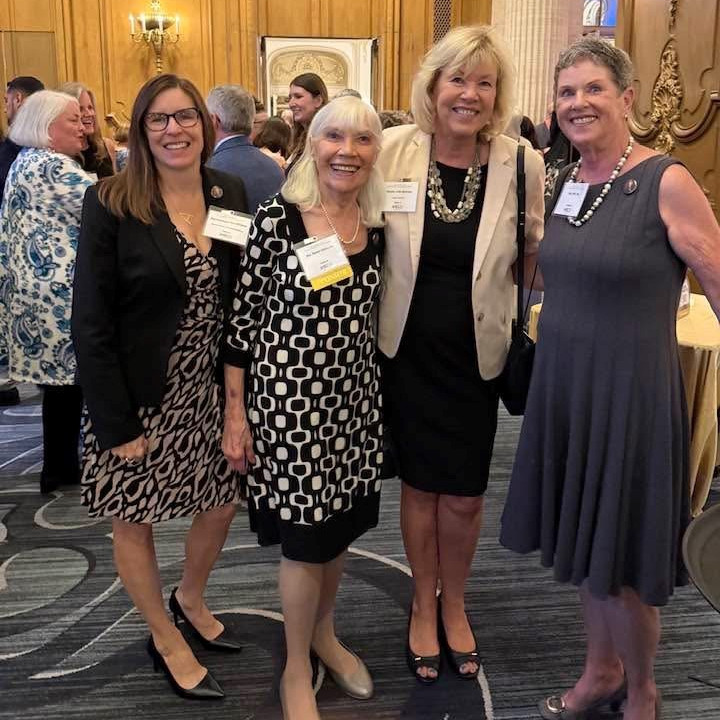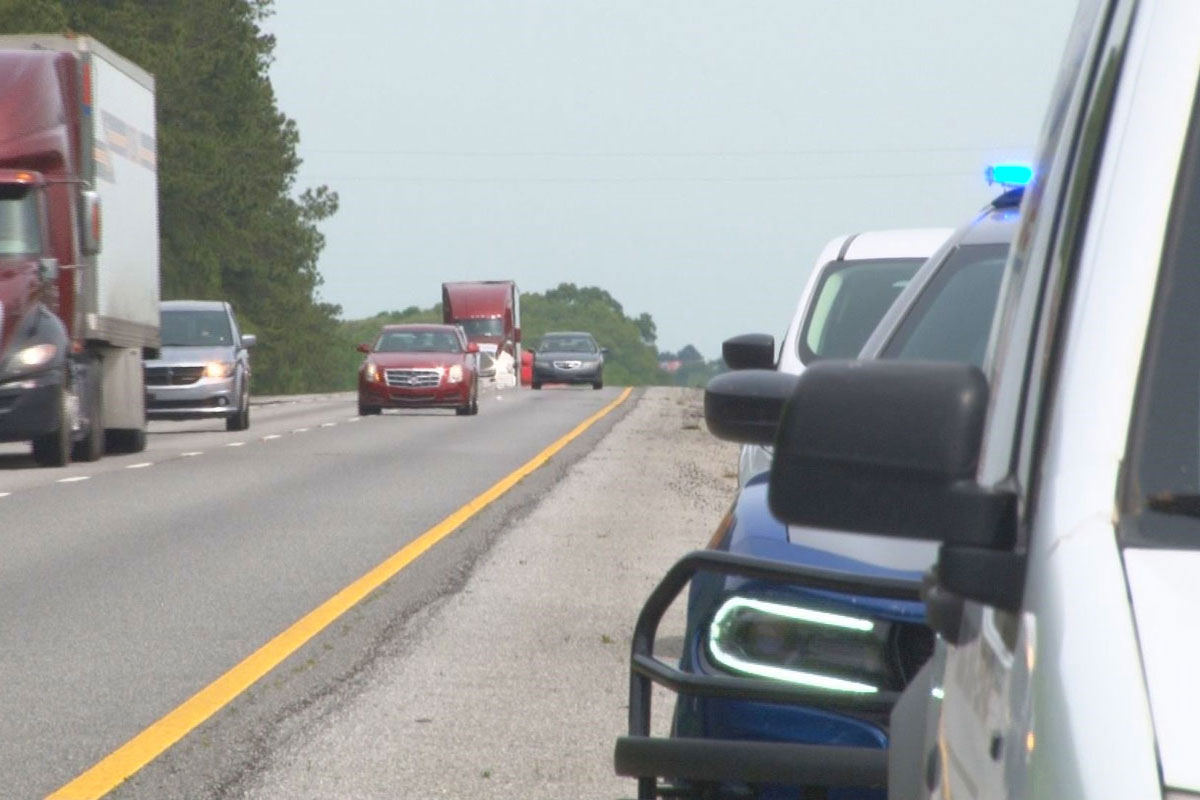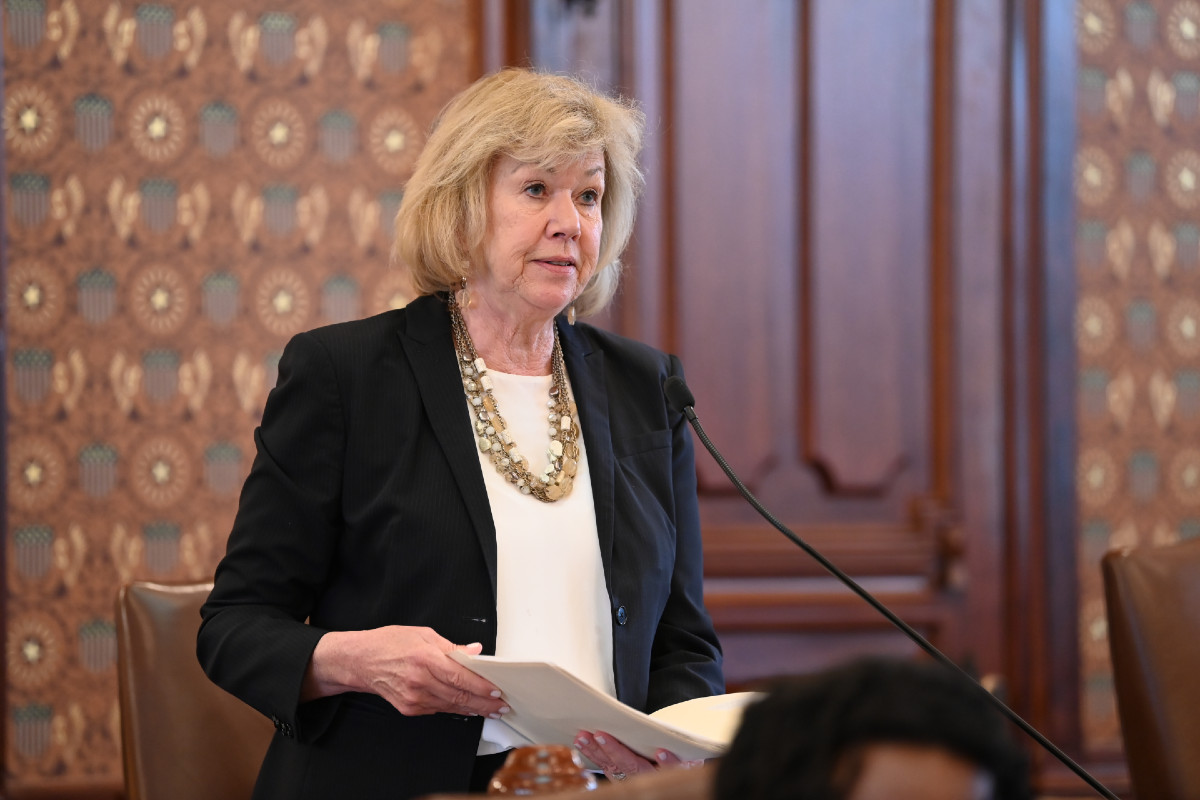- Details
- Category: Latest News

(Illinois Environmental Council's 50th Environmental Leadership Dinner with State Representative Ann Williams, and former Representatives Naomi Jakobsson and Kathy Ryg.)
CHICAGO — Recognizing her longstanding commitment to protecting Illinois’ environment and her recent legislation to phase out the use of toxic PFAS chemicals in everyday products, the Illinois Environmental Council honored State Senator Julie Morrison with the Milestone Achievement Award on Friday.
Leaders from Illinois-based environmental organizations, businesses and local governments joined the IEC at their 50th Environmental Leadership Dinner to celebrate recent achievements in sustainability and recognize individuals whose work has protected and improved quality of life across the state.
Morrison was presented with the Milestone Achievement Award for her work in passing House Bill 2516 — a landmark law that phases out intentionally added PFAS, also known as “forever chemicals,” in children’s products, cosmetics, sleepwear, menstrual products and dental floss sold in Illinois by 2032.
PFAS are synthetic chemicals that do not break down easily and can accumulate in our bodies and water supplies over time. Studies have linked PFAS exposure to serious health risks including cancer, hormone disruption, immune system damage and developmental problems in children. The new law is a significant step in protecting Illinois communities by reducing long-term exposure to these harmful toxins.
- Details
- Category: Latest News
Dear neighbor,
I am staying in close contact with local leaders and monitoring the situation as the federal administration moves forward with plans to station ICE agents and National Guard troops at Naval Station Great Lakes and throughout Chicago. These actions — without invitation or justification — represent an alarming overreach of federal power. Threatening U.S. cities with military tactics is not only an affront to our democracy, it erodes the trust and cooperation that real public safety requires.
I stood with Lake County leaders, state officials, community members and organizations to make our position clear: This federal presence is not needed here. Watch my remarks here:
As your state senator, I can tell you Illinois has made real progress in reducing violence. There is no data showing we are in a crisis that warrants a military takeover. The people being targeted are not criminals — they are our neighbors, our friends, the kids learning in classrooms alongside our children, and the hardworking business owners in our communities, who are all living in fear.
With limited information being shared with the city and state, there is much uncertainty about what to expect. I’ve included below a few reliable resources for you to share with those who may need them.
Sincerely,
Julie Morrison
State Senator | 29th District
- Details
- Category: Latest News
 SPRINGFIELD — A new law championed by State Senator Julie Morrison strengthens protections for roadside emergency workers, pedestrians and others who step in to help during traffic incidents. Building on Illinois’ existing “Move Over” law, the measure ensures people are safe at active emergency scenes — not only when vehicles are stopped.
SPRINGFIELD — A new law championed by State Senator Julie Morrison strengthens protections for roadside emergency workers, pedestrians and others who step in to help during traffic incidents. Building on Illinois’ existing “Move Over” law, the measure ensures people are safe at active emergency scenes — not only when vehicles are stopped.
“Too many officers, highway workers and bystanders have been injured because drivers weren’t paying attention,” said Morrison (D-Lake Forest). “This law makes it clear that if someone is out on the road assisting at an emergency scene, you need to slow down and give them space.”
The new law comes in response to an accident in which a resident of Morrison’s district who was working for the Illinois Tollway was struck by a vehicle while assisting someone in an emergency situation. While current Scott’s Law provisions require drivers to yield and move over for stationary emergency vehicles with flashing lights, it does not extend the same protections to people in motion, such as those placing cones, directing traffic or assisting others outside their vehicles.
- Details
- Category: Latest News
 SPRINGFIELD — Building on Illinois’ existing protections for sexual assault survivors, a new law led by State Senator Julie Morrison strengthens how hospitals provide care in the aftermath of an assault — ensuring survivors receive the timely treatment and support they need.
SPRINGFIELD — Building on Illinois’ existing protections for sexual assault survivors, a new law led by State Senator Julie Morrison strengthens how hospitals provide care in the aftermath of an assault — ensuring survivors receive the timely treatment and support they need.
“We’ve heard heartbreaking stories from survivors who sought help and were turned away, told to travel far distances for support or were left without clear guidance on what to do next,” said Morrison (D-Lake Forest). “Updating our laws is about listening to those experiences — this is more than words on a page, it’s about making changes that have a real impact on real people.”
The new law builds on the work of the state’s Sexual Assault Medical Forensic Services Task Force, which was formed in 2018 to strengthen Illinois’ landmark sexual assault care law. Morrison partnered with the Illinois Attorney General’s Office on the initiative, which focuses on removing barriers and ensuring hospitals provide timely and trauma-informed care to survivors.
More Articles …
- Illinois joins the fight against dangerous chemicals under new Morrison law
- New Morrison law strengthens Illinois’ response to human trafficking
- Morrison-led Alicia’s Law strengthens protections against online child exploitation
- Morrison prioritizes student safety under new law requiring seat belts on school buses
Page 1 of 97





